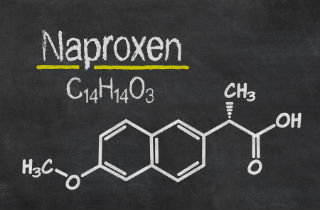No, you cannot get high on naproxen.
In fact, naproxen is a non-narcotic non-steroidal anti-inflammatory drug (NSAID) commonly prescribed and available over the counter. We’ll review the common uses of naproxen, the ways that naproxen affects the central nervous system and naproxen’s addiction liability here. Please leave your questions or comments about naproxen use at the end!
Naproxen chemistry and use
Naproxen is a non-narcotic pain medications frequently prescribed for the treatment of headaches and other minor aches and pains. Naproxen is also helpful when used as an anti-inflammatory agent for conditions such as arthritis and other disorders of the muscles and bones. But how does naproxen work? And is naproxen different than other prescription pain pills?
The way that naproxen works in the body is fundamentally different to other opioid prescription pain killers that contain oxycodone, tramadol, or hydrocodone. These stronger pain medications bind to opioid receptors in the body and are KNOWN and even expected to cause central nervous system reactions such as euphoria (an extreme sense of well being) or dissociation. This is why these drugs can make you feel high.
In contrast, the chemical reactions that occur in the body after taking naproxen are totally different. Naproxen is in a class of drugs known as non-steroidal anti inflammatory drugs (NSAIDs). NSAIDs work by inhibiting prostaglandin synthesis. As naproxen enters the bloodstream, cyclo-oxygenase (COX) enzymes that produce prostaglandin are blocked, and pain decreases in minutes to hours. In sum, NSAIDs do not bind to opioid receptors in the brain and body, and DO NOT produce euphoric effect.
Naproxen and central nervous system effects
However, there are other ways that naproxen affects the central nervous system. Naproxen may cause neurological effects which can alter or impair physical or mental abilities and affect performance. These include:
- blurred vision
- dizziness
- drowsiness
- lightheadedness
- slowed mental alertness
Naproxen can also cause side effects which affect the gastrointestinal and cardiovascular systems of the body. Furthermore, alcohol consumption increases the risk of gastrointestinal bleeding when combined with naproxen.
Drugs that contain naproxen
Aleve
Anaprox
Anaprox DS
EC-Naprosyn
Mediproxen
Midol Extended Relief
Naprelan
Naprosyn
Pamprin Maximum Strength All Day Relief
Can I get addicted to naproxen?
No, people who take naproxen as a long-term medication do not develop tolerance for naproxen or experience withdrawal when they stop taking the drug. Additionally, because you cannot get high on naproxen, you cannot develop a mental dependence on it. However, you should ask your doctor about possible drug interactions before you start taking naproxen regularly, and always seek help if you experience skin changes such as rashes or swelling, difficulty breathing or difficulty urinating.
Questions about naproxen use?
Please forward us your questions about naproxen or other NSAIDs. If we cannot answer them personally, we can help you find an answer or a referral.









Related Posts